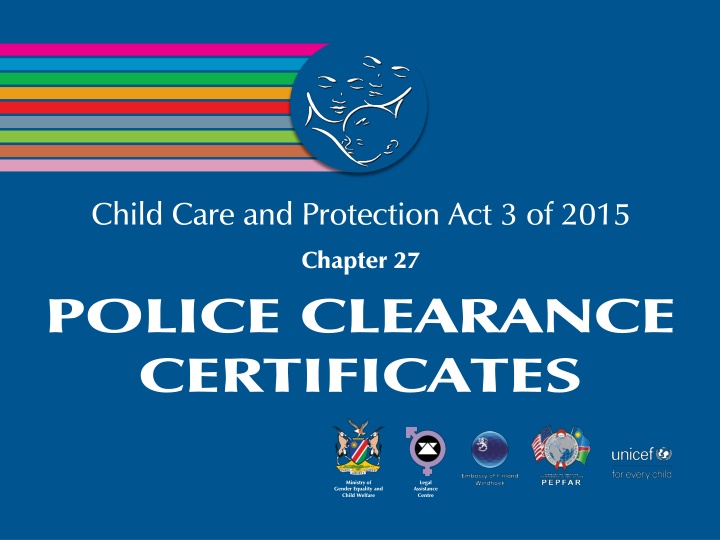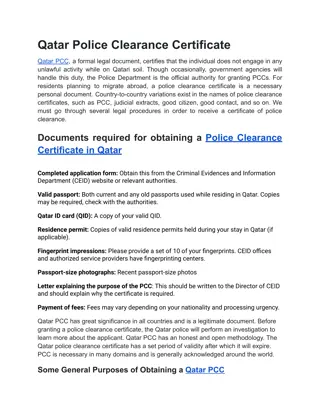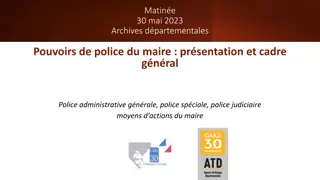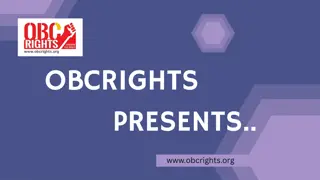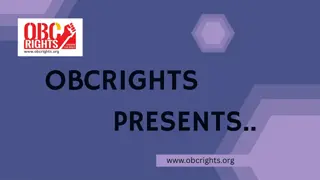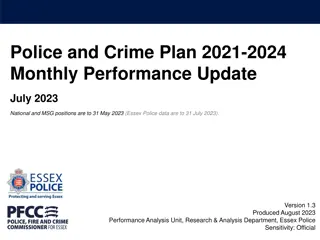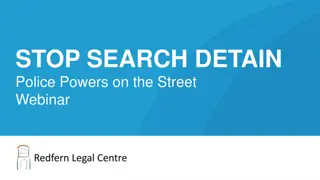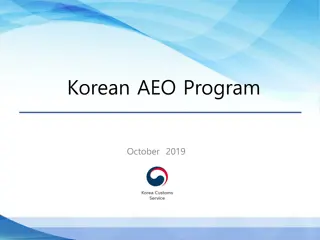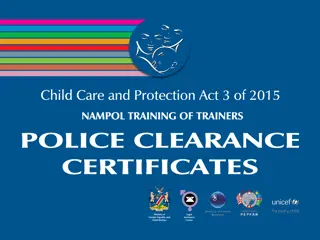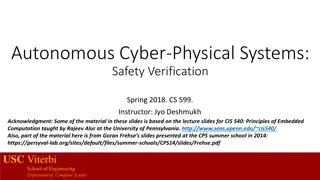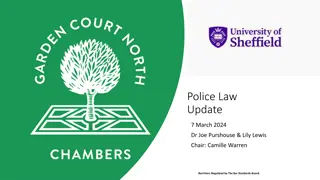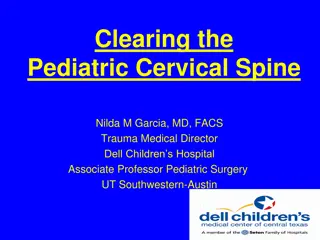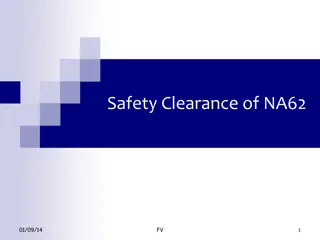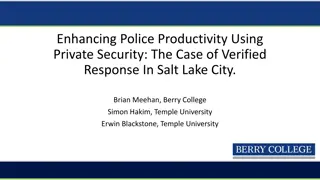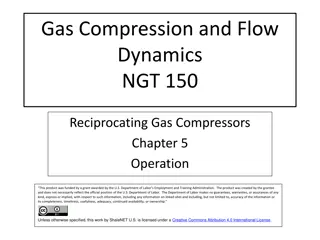Child Care and Protection Act: Police Clearance Certificates Overview
The Child Care and Protection Act of 2015 mandates individuals working with children to obtain police clearance certificates to ensure they have no history of specified crimes related to violence or child abuse. This article discusses the purpose, requirements, transitional provisions, and implications under the Act, highlighting the importance of safeguarding children in various settings. It also addresses how past convictions impact employment under the Labour Act, emphasizing the need for fair procedures and potential redeployment opportunities.
Download Presentation

Please find below an Image/Link to download the presentation.
The content on the website is provided AS IS for your information and personal use only. It may not be sold, licensed, or shared on other websites without obtaining consent from the author.If you encounter any issues during the download, it is possible that the publisher has removed the file from their server.
You are allowed to download the files provided on this website for personal or commercial use, subject to the condition that they are used lawfully. All files are the property of their respective owners.
The content on the website is provided AS IS for your information and personal use only. It may not be sold, licensed, or shared on other websites without obtaining consent from the author.
E N D
Presentation Transcript
Child Care and Protection Act 3 of 2015 Chapter 27 POLICE CLEARANCE CERTIFICATES Ministry of Gender Equality and Child Welfare Legal Assistance Centre
OVERVIEW The Act requires persons who work directly with children in certain capacities to obtain police clearance certificates showing that they have not been convicted of specified crimes relating to violence or child abuse. Some of the provisions on police clearance certificates are confusing and inconsistent. This is an aspect of the Child Care and Protection Act that may need future polishing.
1. What is a police clearance certificate? A police clearance certificate is a certificate issued by the police listing all past convictions for any crimes, no matter how long ago. The certificate will indicate the date when it was issued. It obviously lists only convictions prior to that date.
What is the purpose of requiring these certificates?
2. Who must get a police clearance certificate? Persons who work with or have access to children at a place providing welfare services (includes schools) Designated social workers or probation officers Person managing or operating a place providing welfare services Alternative care-giver or adoptive parent Person having business interest in a entity relating to supervision or care of a child AND access to or authority over a child Person in a position of supervision or authority over a child
Transitional provision any person acting in the specified capacities who is providing welfare services to children before the commencement of these regulations must obtain a police clearance certificate within six months of the commencement of the regulations relevant date = 30 June 2019 Was this enforced?
Labour Act Where an employer is prohibited by the Child Care and Protection Act from employing a person because of past convictions, a dismissal on this basis is presumably NOT an unfair dismissal . Employer should offer redeployment if possible. Procedure should follow Labour Act requirements.
3. Relevant crimes l Indecent assault Kidnapping Murder Trafficking Rape Incest Any offence relating to pornography Any statutory sexual offence Assault with intent to cause grievous bodily harm These crimes disqualify a person from being fit to work with children regardless of whether the victim was a child or an adult.
4. Prohibitions Employer Penalties All persons Persons MAY NOT act in certain capacities if they have ever been convicted of a crime listed in the Act. A person MAY NOT employ a person convicted of any of the listed offences in any of the specified capacities. Before employing a person in any of the specified capacities, the employer must confirm no convictions for the specified crimes in past 10 years. Same penalty for violating these rules applies to persons working with children AND to employers: Fine of up to N$20 000 or imprisonment for of up to 5 years, or both
Other police clearance certificate requirements Other provisions in Act / regulations also require police clearance certificates for specific persons: designated social workers & probation officers employees of designated child protection organisations prospective adoptive parents prospective foster parents private homes used as places of safety adult supervisor of child-headed household board & staff of children s homes/child detention facilities prevention & early intervention service providers.
5. Register of convictions for listed offences Police clearance certificates do not have to be renewed but Ministry is required to keep a register of convictions for listed offences. The idea is that persons who commit any of the listed offences afterthey have provided their police clearance certificates can be identified and prevented from working with children. The Minister must designate a staff member as the Registrar to keep the register of convictions
Courts duty to share information A court which has convicted a person of any of the listed offences has a duty to ensure that the relevant information is shared with the registrar. This requirement has not yet been operationalised with regulations on what information the court must share.
Public duty to share information Any member of the public who has information that a person convicted of any listed crimes: is employed has applied for a job is acting in a specified capacity MUSTinform the registrar. ***
